
Muller traveled across Europe in search of historical artifacts.
She also interviewed dozens of Polish residents who were imprisoned after World War II on grounds they were political enemies.
So when University of Michigan-Dearborn posted a vacancy for an endowed professorship in Polish, Polish American and Eastern European Studies, Muller was quick to apply. Her background in East European history, combined with her ongoing research in Poland, inspired the College of Arts, Sciences, and Letters (CASL) to bring Muller to campus this fall as an assistant professor.
"We are absolutely thrilled to have Dr. Muller on our faculty," said CASL Dean Martin Hershock. "She is a very highly-regarded young scholar and she brings to the campus a wealth of experiences and historical tools."
Muller can thank longtime Dearborn residents Frank and Mary Padzieski for her new role on campus. The couple established an endowed professorship at UM-Dearborn, in an effort to ensure the continued study of their heritage after their passing. Both Frank and Mary Padzieski have passed away, but Muller will honor the philanthropic couple through education.
“Mother and Dad always celebrated and fully embraced their Polish roots,” said daughter Joanna Padzieski Cortright. “My brothers and I are happy to see the project come to fruition and are pleased that our parents were able to leave this legacy for future generations.”
Muller arrived at UM-Dearborn this month from the University of Florida, where she taught European Studies. When she’s not entrenched in the classroom, Muller continues to study Polish history.
As part of her doctoral program at Indiana University, Muller conducted numerous oral history interviews with Polish political prisoners who were imprisoned after WWII. Some were imprisoned for up to 15 years after the war concluded, Muller said.
“These are people who opened up to me about their incredible lives and war activism,” she said. “What was fascinating for me was the alternative world they created in their prison cells.”
Muller soon hopes to implement her oral history interviews into the classroom at UM-Dearborn. She also is excited about helping to create exhibitions about concentration camps and the Holocaust at the Museum of the Second World War, which is slated to open in Poland in 2015, and where Muller serves as co-curator.
"Professor Muller's work with female political prisoners in Stalinist Poland is both imaginative and compelling, and her work with the soon-to-be-opened Museum of the Second World War speaks to her ability to easily cross the often rigid line between academic and public history," Hershock said.




